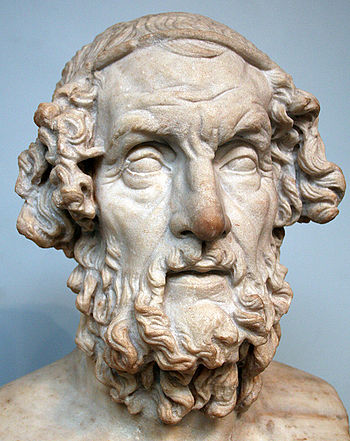Portal:Poetry
Welcome to the Poetry Portal


Poetry (from the Greek word poiesis, "making") is a form of literary art that uses aesthetic and often rhythmic qualities of language to evoke meanings in addition to, or in place of, literal or surface-level meanings. Any particular instance of poetry is called a poem and is written by a poet. Poets use a variety of techniques called poetic devices, such as assonance, alliteration, euphony and cacophony, onomatopoeia, rhythm (via metre), and sound symbolism, to produce musical or incantatory effects. Most poems are formatted in verse: a series or stack of lines on a page, which follow a rhythmic or other deliberate pattern. For this reason, verse has also become a synonym (a metonym) for poetry.
Poetry has a long and varied history, evolving differentially across the globe. It dates back at least to prehistoric times with hunting poetry in Africa and to panegyric and elegiac court poetry of the empires of the Nile, Niger, and Volta River valleys. Some of the earliest written poetry in Africa occurs among the Pyramid Texts written during the 25th century BCE. The earliest surviving Western Asian epic poem, the Epic of Gilgamesh, was written in the Sumerian language.
Early poems in the Eurasian continent evolved from folk songs such as the Chinese Shijing as well as from religious hymns (the Sanskrit Rigveda, the Zoroastrian Gathas, the Hurrian songs, and the Hebrew Psalms); or from a need to retell oral epics, as with the Egyptian Story of Sinuhe, Indian epic poetry, and the Homeric epics, the Iliad and the Odyssey. (Full article...)
Selected article

The Aeneid (/ɪˈniːɪd/; Latin: Aeneis [ae̯ˈneːɪs]) is a Latin epic poem, written by Virgil between 29 and 19 BC, that tells the legendary story of Aeneas, a Trojan who travelled to Italy, where he became the ancestor of the Romans. It is composed of 9,896 lines in dactylic hexameter. The first six of the poem's twelve books tell the story of Aeneas's wanderings from Troy to Italy, and the poem's second half tells of the Trojans' ultimately victorious war upon the Latins, under whose name Aeneas and his Trojan followers are destined to be subsumed.
The hero Aeneas was already known to Greco-Roman legend and myth, having been a character in the Iliad, composed in the 8th century BC. Virgil took the disconnected tales of Aeneas's wanderings, his vague association with the foundation of Rome and a personage of no fixed characteristics other than a scrupulous pietas, and fashioned this into a compelling founding myth or national epic that at once tied Rome to the legends of Troy, explained the Punic wars, glorified traditional Roman virtues and legitimized the Julio-Claudian dynasty as descendants of the founders, heroes and gods of Rome and Troy. (Full article...)
Selected image
Poetry WikiProject

Selected biography
Matsuo Bashō (松尾 芭蕉, 1644 – 1694), born error: error: {{nihongo}}: Japanese or romaji text required (help): Japanese or romaji text required (help), then Matsuo Chūemon Munefusa (松尾 忠右衛門 宗房), was the most famous poet of the Edo period in Japan. During his lifetime, Bashō was recognized for his works in the collaborative haikai no renga form; today, after centuries of commentary, he is recognized as the greatest master of haiku (then called hokku). Matsuo Bashō's poetry is internationally renowned; and, in Japan, many of his poems are reproduced on monuments and traditional sites. Although Bashō is justifiably famous in the West for his hokku, he himself believed his best work lay in leading and participating in renku. He is quoted as saying, “Many of my followers can write hokku as well as I can. Where I show who I really am is in linking haikai verses.”
Bashō was introduced to poetry young, and after integrating himself into the intellectual scene of Edo (modern Tokyo) he quickly became well known throughout Japan. He made a living as a teacher; but then renounced the social, urban life of the literary circles and was inclined to wander throughout the country, heading west, east, and far into the northern wilderness to gain inspiration for his writing. His poems were influenced by his firsthand experience of the world around him, often encapsulating the feeling of a scene in a few simple elements. (Full article...)
Did you know (auto-generated) -

- ... that poet Trina de Moya was the first Dominican presidential wife to be called first lady?
- ... that the 19th-century poet Cyprian Norwid, now recognized as one of the most important Polish poets, led a poverty-stricken life and his works were rarely appreciated until decades after his death?
- ... that Jack G. Downing, the only person to serve as CIA station chief in Moscow and Beijing, "read Chinese poetry for kicks"?
- ... that Canticle IV: The Journey of the Magi, a 1971 composition for three male solo voices and piano by Benjamin Britten, sets a T. S. Eliot poem to music?
- ... that the 14th- and 15th-century Azerbaijani poet Imadaddin Nasimi was possibly flayed alive after he was accused of being a kafir by Sunni scholars?
- ... that Rabia Balkhi is the first known Persian woman poet?
Selected poem
| The Erl-King (Der Erlkönig) by Johann Wolfgang von Goethe |
|---|
|
Who rides there so late through the night dark and drear?
The father it is, with his infant so dear;
"My father, my father, and dost thou not hear
|
Related portals
Topics
Recognized content
Categories
Associated Wikimedia
The following Wikimedia Foundation sister projects provide more on this subject:
-
Commons
Free media repository -
Wikibooks
Free textbooks and manuals -
Wikidata
Free knowledge base -
Wikinews
Free-content news -
Wikiquote
Collection of quotations -
Wikisource
Free-content library -
Wikiversity
Free learning tools -
Wiktionary
Dictionary and thesaurus






















